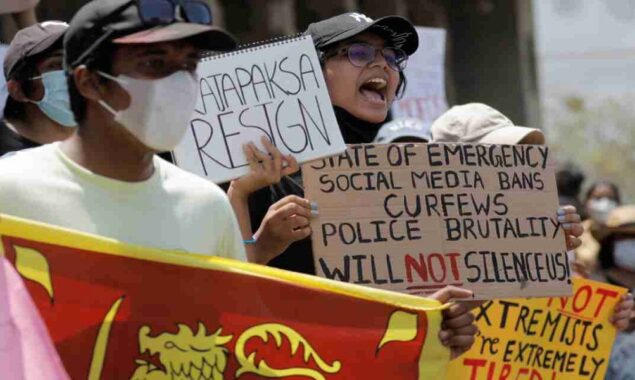
On Tuesday, Sri Lanka’s governing party blocked a no-confidence resolution against President Gotabaya Rajapaksa, whose departure from office has been pivotal to widespread protests sparked by the country’s worst economic crisis in its history.
The South Asian island country is on the verge of bankruptcy, and the government is looking for a financial lifeline from other nations and organizations in order to continue importing essential commodities, medications, and gasoline.
For more than a month, protesters around the island nation have called for Rajapaksa’s departure, accusing him of dragging the country into bankruptcy.
The resolution, introduced on Tuesday by M.A. Sumanthiran of the opposition Tamil National Alliance party, aimed to circumvent protocol in order to criticize the president for the situation. It was defeated by the ruling party with a 119-68 vote.
“Your names have been displayed on the board today. The country now knows who is protecting the president, who does not protect you,” Sumanthiran told parliamentarians after the vote.
Protesters in Sri Lanka have demanded that the Rajapaksas, the country’s most powerful political dynasty, be removed from power.
The family is accused of corruption and mismanagement of the economy, as the country of 22 million people faces rising shortages of critical items, record inflation, and frequent blackouts.
The decision on Tuesday looks to have bolstered demonstrators’ calls for the president to resign.
“We are thoroughly disappointed about the appointment of a prime minister who is another stooge of the Rajapaksa family,” Anuruddha Bandara, an activist behind the #GotaGoHome campaign on social media, told media.
“We will not let this go until the president steps down.”
It’s uncertain if the no-confidence motion will be revived.
The legislative session on Tuesday was the first since last week’s violence between protestors, government supporters, and police killed nine people and wounded hundreds more. It was also the first with new Prime Minister Ranil Wickremesinghe, who took over after the president’s brother, Mahinda Rajapaksa, resigned in the aftermath of the tragic clashes.
Wickremesinghe provided a dismal assessment of the country’s dire prognosis on Monday, stating that $75 billion is urgently required to assist deliver critical products, while the country’s treasury is struggling to obtain even $1 billion.
“At the moment, we only have petrol stocks for a single day,” he said in a televised speech. “The next couple of months will be the most difficult ones of our lives.”
For the latest International News Follow BOL News on Google News. Read more on Latest International News on oldsite.bolnews.com
Read More News On
Catch all the International News, Breaking News Event and Latest News Updates on The BOL News
Download The BOL News App to get the Daily News Update & Follow us on Google News.




